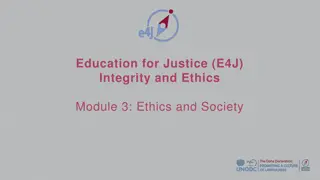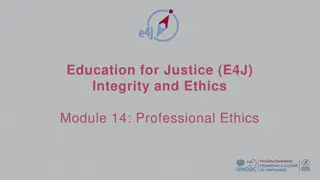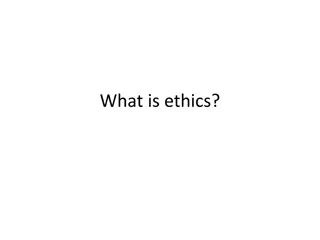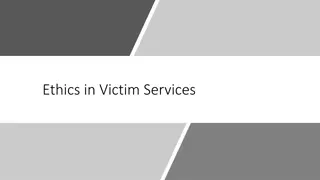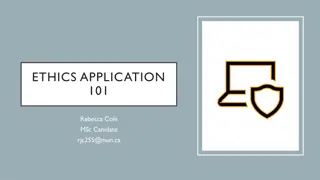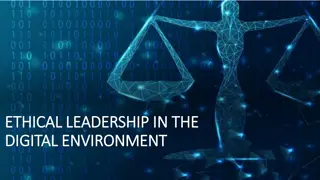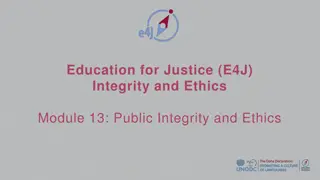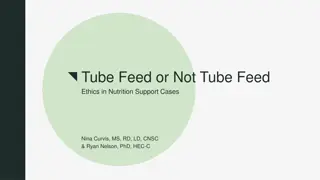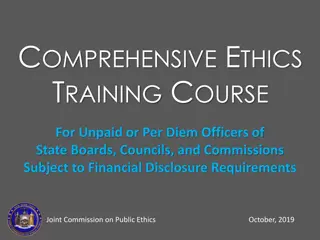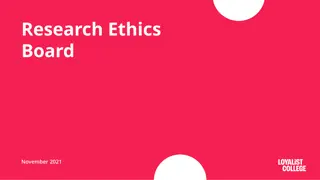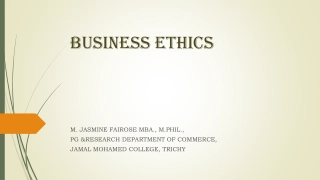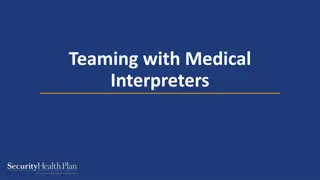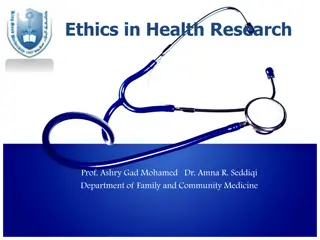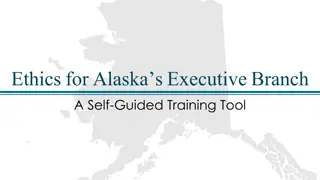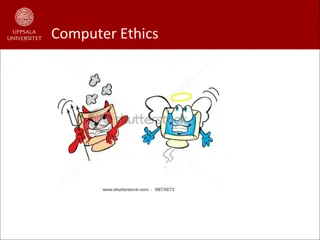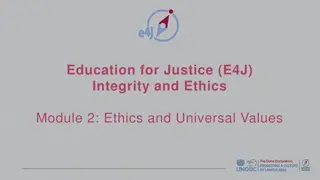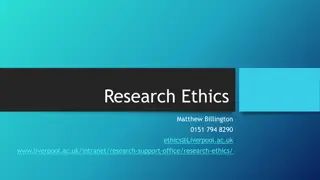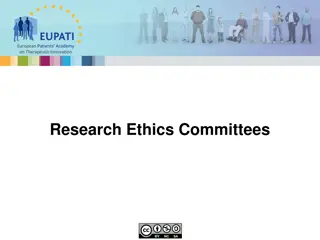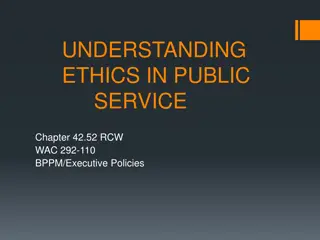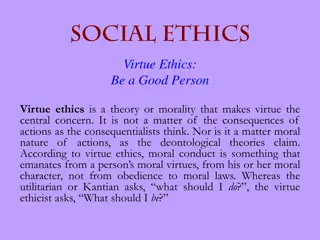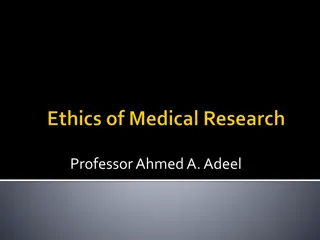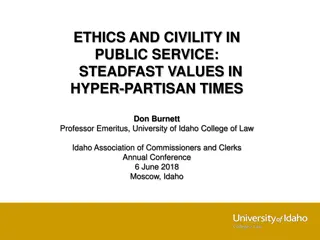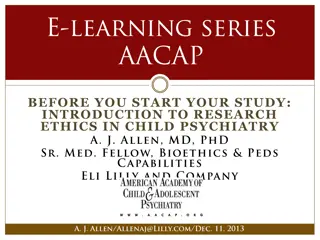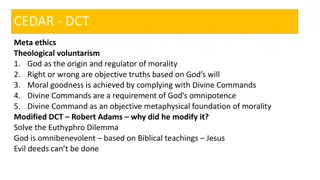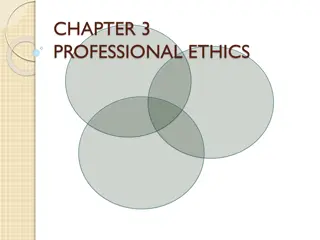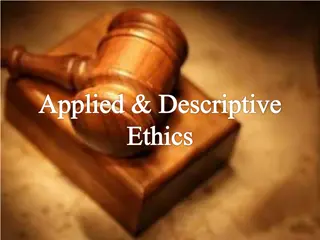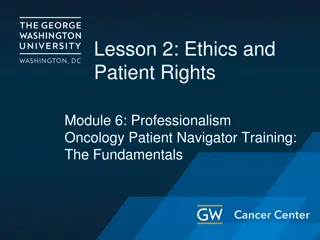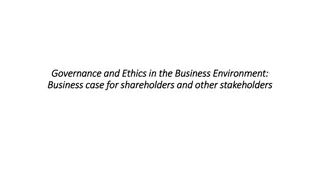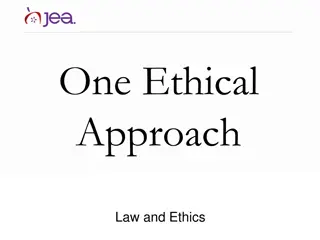Understanding Ethics: The Role and Importance in Society
Ethics, derived from the Greek word "ethos," plays a crucial role in distinguishing between right and wrong actions in human society. It involves a set of theories that guide moral decisions and define values, virtues, and vices. Through the analysis of ethical arguments, identification of premises and conclusions, and detection of logical fallacies, individuals can navigate ethical trade-offs in decision-making. Professional codes of ethics further shape behavior and help maintain ethical standards in various fields, including information technology.
Download Presentation

Please find below an Image/Link to download the presentation.
The content on the website is provided AS IS for your information and personal use only. It may not be sold, licensed, or shared on other websites without obtaining consent from the author. Download presentation by click this link. If you encounter any issues during the download, it is possible that the publisher has removed the file from their server.
E N D
Presentation Transcript
ETHICS Analyze an argument to identify premises and conclusion using ethical theories Understand the use of ethical theories in ethical arguments Detect basic logical fallacies in an argument Articulate the ethical tradeoffs in a technical decision Understand the role of professional codes of ethics
PREMISES & CONCLUSION USING ETHICAL THEORIES Athenian court sentenced Socrates to death for going around Athens asking its citizens the ultimate questions of human existence The unexamined life is not worth living , Socrates He believed in a science that represents rational over meaningless existence Socrates s pursuit was due to Greeks curiosity and the desire to learn about themselves, human life and Society This led to the examination of all human life and philosophers termed it as Ethics Ethics can also be defined as a theoretical examination of morality or theory of morals
DEFINITION OF ETHICS AS A SET OF THEORIES The word ethics comes from the ancient Greek word ech , which means character Robert C. Solomon, defines ethics as a set of theories of value, virtue, or of right (valuable) action O.J. Johnson, defines ethics as a set of theories that provide general rules or principles to be used in making moral decisions and, unlike ordinary intuitions, provides a justification for those rules Every human society practices ethics in some way because, every society attaches a value of good to bad to an individual s actions according to where the actions fall within the domain of that society s rules
DEFINITION OF ETHICS Ethics Set of beliefs about right and wrong behavior Moral principles that govern a person's behaviour or the conducting of an activity. Virtues Habits that incline people to do what is acceptable Vices Habits of unacceptable behavior Virtues and vices define a personal value system Scheme of moral values ETHICS IN INFORMATION TECHNOLOGY, FOURTH EDITION 5
THE ROLE OF ETHICS The role of ethics is to help societies distinguish between right and wrong A basis for justifying the judgment of human actions in a society Ethics is, therefore, a field of inquiry whose subject is human actions, collectively called human conduct, that are taken consciously, willfully, and for which one can be held responsible According to Fr. Austin Fagothey, such acts must have knowledge and have freedom to signify the presence of free choice to act or not to act
THE PURPOSE OF ETHICS Purpose is to interpret human conduct, acknowledging and distinguishing between right and wrong The interpretation is based on a system which uses a mixture of induction and deduction In most cases, these arguments are based on historical schools of thought called ethical theories There are many different kinds of ethical theories, and within each theory there may be different versions of that theory
ETHICAL THEORIES Human actions are judged good or bad, right or wrong based on theories or systems of justice Such theories are commonly known as ethical theories An ethical theory determines if an action or set of actions is morally right or wrong and the codes of ethics are based on ethical theories Ethical theories fall into two categories: those based on one choosing his or her action based on the expected maximum value or values as a consequence of the action and those based on one choosing his or her action based on one s obligation or requirements of duty The Greeks called the first category of theories telos, meaning purpose or aim. We now call these teleological or consequentialist theories The Greeks called the second category of theories deon, meaning binding or necessary. Today, we call them deontological theories
CONSEQUENTIALIST THEORIES Right action good consequences Those who subscribe to this position are called consequentialists. Consequentialist theories judge human actions as good or bad, right or wrong, based on the best attainable results of such actions a desirable result denotes a good action, and vice versa Richard T. Hull, consequentialist theories have three parts: a theory of value, a principle of utility, and a decision procedure
CONSEQUENTIALIST THEORIES For example, in the theory of value there are several other theories held by consequentialists including: Hedonism, which equates good with pleasure, bad or evil with pain Eudamonism, which equates good with happiness, bad or evil with unhappiness Agathism, which views good as an indefinable, intrinsic feature of various situations and states Agapeism, which equates good with love, bad with hate Values pluralism, which holds that there are many kinds of good, including pleasure and happiness, but also knowledge, friendship, love, and so forth
DEONTOLOGICAL THEORIES The theory of deontological reason does not concern itself with the consequences of the action but rather with the will of the action An action is good or bad depending on the will inherent in it According to deontological theory, an act is considered good if the individual committing it had a good reason to do so For example, we know that hitting is bad, but if an armed intruder enters your house and you hurt him in self defense, your action is good, according to deontologists. You did it because you had a duty to protect your family and property
TYPES OF DEONTOLOGICAL THEORIES Deontologists fall into two categories: act deontologists and rule deontologists Act deontologists consider every judgment of moral obligation to be based on its own merit. We decide separately in each particular situation what is the right thing to do Rule deontologists consider that one s duty in any situation is to act within rules
LAYERS OF REASONING The process of ethical reasoning takes several steps before one can justify to someone else the goodness or badness, rightness or wrongness of one s action For example, if you want to convince someone to own a corporate insurance, you need to explain that person why is it beneficial In such an exercise, you may start by explaining that we are living in difficult times and that it is usually not safe Then the person will ask why it is not safe, to which you might reply
THE SPECTRUM OF HUMAN ACTIONS Human actions are wide-ranging, from simple, traditional and easy to understand actions like happiness or sadness, to complex and abstract ones like hacking, mobile phone scanning On one side, the inputs have straight output value judgments The other end of the spectrum, however, has inputs that cannot be easily mapped into the same output value judgments and the actions of this side are created as a result of computer technology It is at this end, therefore, that we need an updated definition of ethics a functional definition
CODES OF ETHICS The main domains in which ethics is defined are governed by particular guidelines called codes of ethics These rules, guidelines, canons, advisories, are usually followed by members of the respective domains For example, your family has an ethical set of rules that every member of the family must observe Your University has a set of conduct rules that all students, staff and faculty must observe that govern the use of computers and Internet Services
CODES OF ETHICS (CONTD) So depending on the domain, ethical codes can take any of the following forms: principles, which may act as guidelines, references, or bases for some document; public policies, which may include aspects of acceptable behavior, norms, and practices of a society or group; codes of conduct, which may include ethical principles; and legal instruments, which enforce good conduct through courts Although the use of ethical codes is still limited to professions and high visibility institutions and businesses, there is a growing movement toward widespread use
PROFESSIONAL CODE OF ETHICS Some codes are written purposely for the public, others target employees, and yet others are for professionals only For Example, Association of Computing Machinery (ACM) and the Institute of Electric and Electronics Engineers Computer Society (IEEE Computer), both professional organizations Codes for the ACM can be found at www.acm.org/code-of-ethics IEEE Computer at www.ieee.org
ACM CODE OF ETHICS AND PROFESSIONAL CONDUCT GENERAL ETHICAL PRINCIPLES Contribute to society and to human well-being, acknowledging that all people are stakeholders in computing Avoid harm Be honest and trustworthy Be fair and take action not to discriminate Respect the work required to produce new ideas, inventions, creative works, and computing artifacts Respect privacy Honor confidentiality
ACM CODE OF ETHICS AND PROFESSIONAL CONDUCT PROFESSIONAL RESPONSIBILITIES Strive to achieve high quality in both the processes and products of professional work Maintain high standards of professional competence, conduct, and ethical practice Know and respect existing rules pertaining to professional work Accept and provide appropriate professional review Give comprehensive and thorough evaluations of computer systems and their impacts, including analysis of possible risks Perform work only in areas of competence Foster public awareness and understanding of computing, related technologies, and their consequences Access computing and communication resources only when authorized or when compelled by the public good Design and implement systems that are robustly and usably secure
ACM CODE OF ETHICS AND PROFESSIONAL CONDUCT PROFESSIONAL LEADERSHIP PRINCIPLES Ensure that the public good is the central concern during all professional computing work Articulate, encourage acceptance of, and evaluate fulfillment of social responsibilities by members of the organization or group Manage personnel and resources to enhance the quality of working life Articulate, apply, and support policies and processes that reflect the principles of the Code Create opportunities for members of the organization or group to grow as professionals Use care when modifying or retiring systems Recognize and take special care of systems that become integrated into the infrastructure of society
ACM CODE OF ETHICS AND PROFESSIONAL CONDUCT COMPLIANCE WITH THE CODE Uphold, promote, and respect the principles of the Code Treat violations of the Code as inconsistent with membership in the ACM
OBJECTIVES OF CODES OF ETHICS Different domains and groups of people formulate different codes of ethics, but they all have the following objectives: Disciplinary: By instilling discipline, the group or profession ensures professionalism and integrity of its members Advisory: Codes are usually a good source of tips for members, offering advice and guidance in areas where moral issues are fuzzy Educational: Ethical codes are good educational tools for members of the domain, especially new members who have to learn the dos and don ts of the profession Inspirational: Besides being disciplinary, advisory, and educational, codes should also carry subliminal messages to those using them to inspire them to be good Publicity: One way for professions to create a good clientele is to show that they have a strong code of ethics and, therefore, their members are committed to basic values and are responsible
THE RELEVANCY OF ETHICS TO MODERN LIFE Socrates, the unexamined life is not worth living before the Athens court in 399 BC, human life was the same as it is today in almost every aspect except quality Not much has changed in the essence of life since Socrates s time and now We still struggle for the meaning of life, we work to improve the quality of life and we do not rest unless we have love, justice and happiness for all Socrates spent time questioning the people of Athens so that they, together with him, could examine their individual lives to find What I Individually Ought to Do and To Improve the Lot of Humankind Many philosophers and those not so schooled believe that this is the purpose of ethics The purpose of ethics has been and continues to be, to promote the achievement of the The Best, over the long- term
THE DIFFERENCE BETWEEN MORALS, ETHICS, AND LAWS Morals: one s personal beliefs about right and wrong Ethics: standards or codes of behavior expected of an individual by a group Law: system of rules that tells us what we can and cannot do Laws are enforced by a set of institutions Legal acts conform to the law Moral acts conform to what an individual believes is the right belief of right and wrong ETHICS IN INFORMATION TECHNOLOGY, FOURTH EDITION 24
DIFFERENCE BETWEEN ETHICS AND MORALITY
CONTRAST OF ETHICS AND MORAL VALUES
NEXT WEEK Morality, Technology and Value: Identify assumptions and values embedded in a particular computer product design including those of a cultural nature Understand the moral value of technology Understand the role morality plays in decision making Describe positive and negative ways in which computing alters the way decisions are made by different people Explain why computing/network access is restricted in some countries Analyze the role and risks of computing in the implementation of public policy and government Articulate the impact of the input deficit from diverse populations in the computing profession





